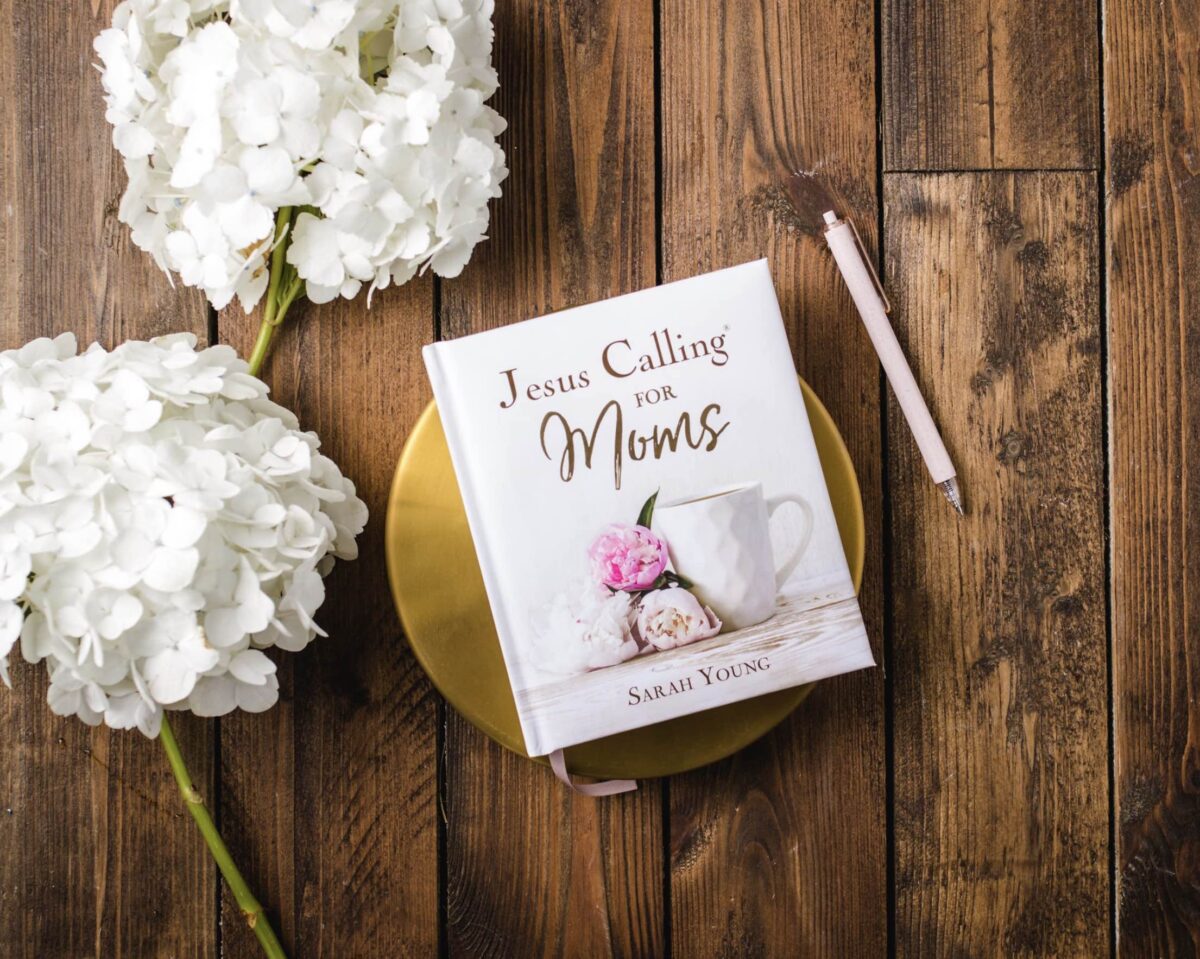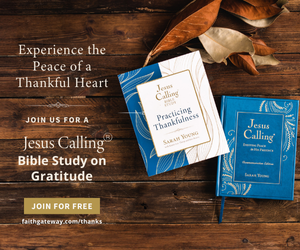Take A Step Of Faith Toward Your Purpose: Emily Chang & Jodi Stuber
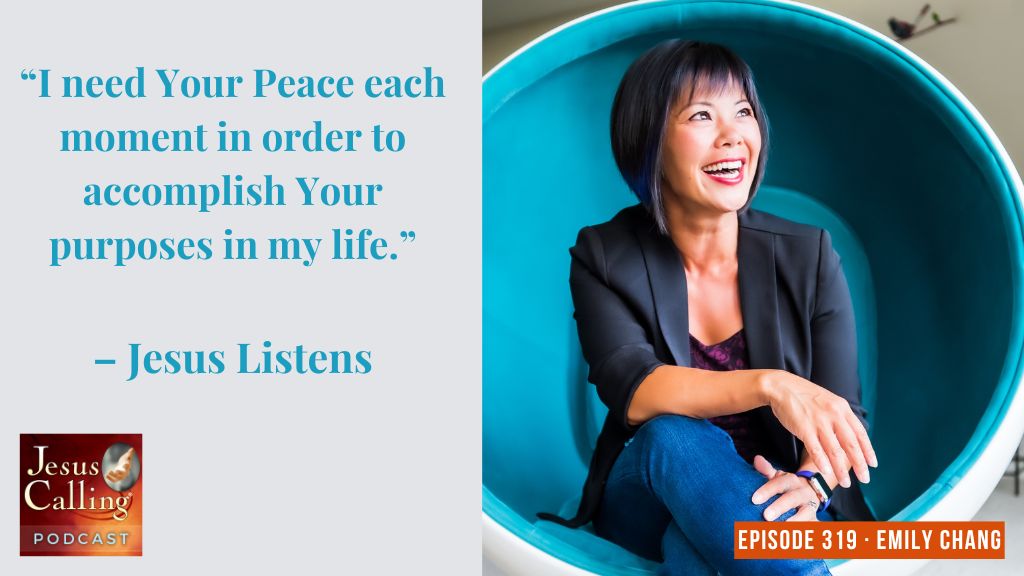
Emily Chang: Faith is taking a step without knowing exactly the outcome, but having absolute conviction that God is at work and you get to be a part of what He is doing. And I think every time you say yes, not only does yes amplify into more yeses, but it strengthens your faith and your conviction. So the next time you say yes, you’ll do it a little less fearfully, and the time after that you’ll do it with anticipation.
Take A Step Of Faith Toward Your Purpose: Emily Chang & Jodi Stuber – Episode #319
Narrator: Welcome to the Jesus Calling Podcast. Are you facing a crossroads in your life where your next move involves taking a step that feels unfamiliar or hard? None of us really knows what the next minutes, days, or weeks might bring, but God does. And when we trust that He is in charge of our future, taking those leaps of faith lead us ever closer to where we’re living in the fullness of who we’re meant to be.
Emily Chang is the CEO of the McCann World Group advertising company. As a successful executive who has headed up initiatives at Starbucks and Apple, it would seem Emily’s legacy might be secured—but her corporate achievements simply were the springboard for the legacy she really wishes to establish—which is to personally make a difference for good in people’s lives by opening up her home to youth in need. Jodi Stuber grew up with a love of horses, always dreaming of having one of her own. When Jodi found out about equine therapy, she knew this great love of horses was just a stepping off point to her true calling of serving people—including children and veterans—by connecting them to animals at the Hopewell Ranch, which she co-founded in 2004.
Let’s start with Emily’s story.
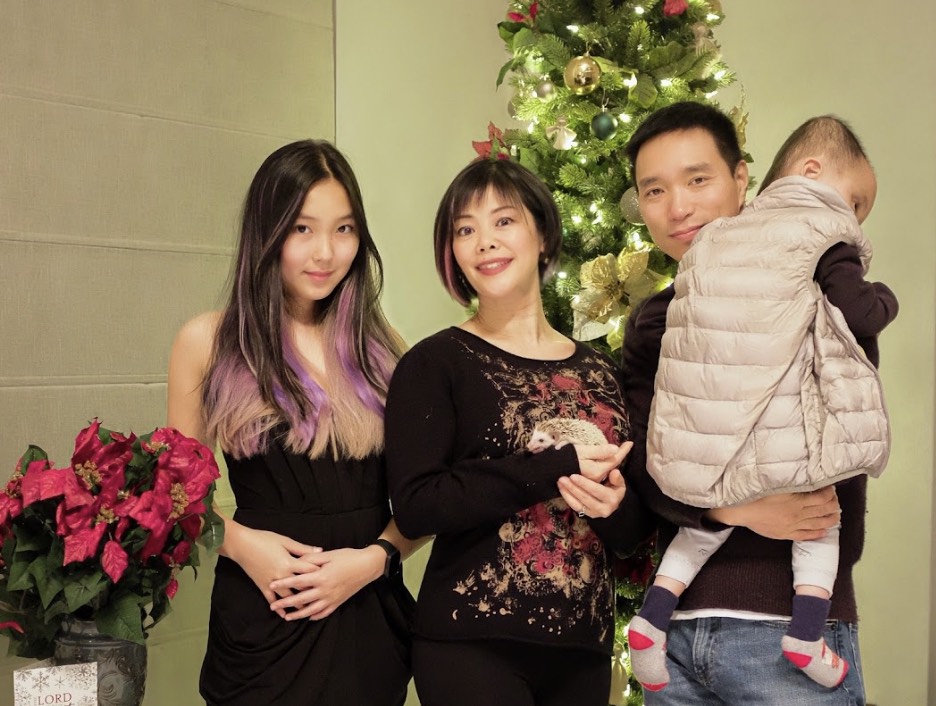
Emily: Hi, I’m Emily Chang. I’m the CEO for McCann World Group here in China. And I’m also the author of a book called The Spare Room. I live in Shanghai with my husband of twenty-two years and my daughter, who’s thirteen years old.
I grew up with very young parents who had just moved to the States from Asia, who didn’t really speak much English. So I would say in a nutshell, my parents were surviving. They were trying to make a better life for their kids, and they were just really focused on us.
In college, as I came into my faith, I started realizing it can be more about thriving than it is about surviving. And absolutely, it’s more about others than it’s about ourselves. My parents did the best they could, but it was a very different environment when I was growing up, one of survival and not of any particular faith. And I think as I came into coming to know Jesus, I found it’s a privilege to know our God. It’s a privilege to understand that we can thrive, we can live in abundance and in joy. And especially when we put others before ourselves, when we put God at the center of our life, everything changes.
“It’s a privilege to know our God. It’s a privilege to understand that we can thrive, we can live in abundance and in joy. And especially when we put others before ourselves, when we put God at the center of our life, everything changes.” – Emily Chang
I’m a very direct person. I’m very Type-A, super passionate and highly energetic. My daughter, even now, just rolls her eyes and says, “Mom, you’re exhausting.” I’ve been this way my whole life. So I think God has had to be very direct with me. It took a little while for me to realize that there is a God, because [my childhood] was pulling yourself up by your bootstraps. It was getting perfect grades. It was doing everything yourself and feeling like hard work pays off and believing, I have to be successful and all of the things that life and society tell you.
Taking a Step of Faith
I was driving home on a late night. I was tired. I worked multiple jobs, putting myself through school—this was in college—and I saw a person on the side of the road, and it was a rainy night. My vision was kind of blurry, and my immediate reaction was to lock my door. And then I’m at a red light. I kind of took a second look because the person was really small, and I suddenly realized, as I wiped the condensation away from my window, it was a child.
So I rolled down my window, and I realized that this child was huddled on a curb in sleeting rain in upstate New York. And I kind of called out into the night and I said, “Are you okay?” And as she slowly lifted up her face, I could see that she’d been hurt. I sat there and the light turned green. And, you know, you watch that watery reflection on your dash and you just think, Drive home. You have so much to do. All I want is some chicken soup. But I couldn’t get myself to step on the gas.
And now, in retrospect, I know that’s the Holy Spirit. I know that’s prompting me to say, Do something for her. You know, pause. But at that point, I just couldn’t drive on. I couldn’t leave her there. And so I invited her to dinner, and I took her to a diner down the street. As she walked out, I just thought, She’s hurt. She has nothing on her. Her clothes are ripped and dirty. I asked her where she was going to stay that night, and she ended up staying with me for one night—she was about the same size, took a shower, wore my clothes, and fell asleep on my couch. And then one night turned into two nights, and then it turned into a week. And before you know it, she’s staying with me for about four months.
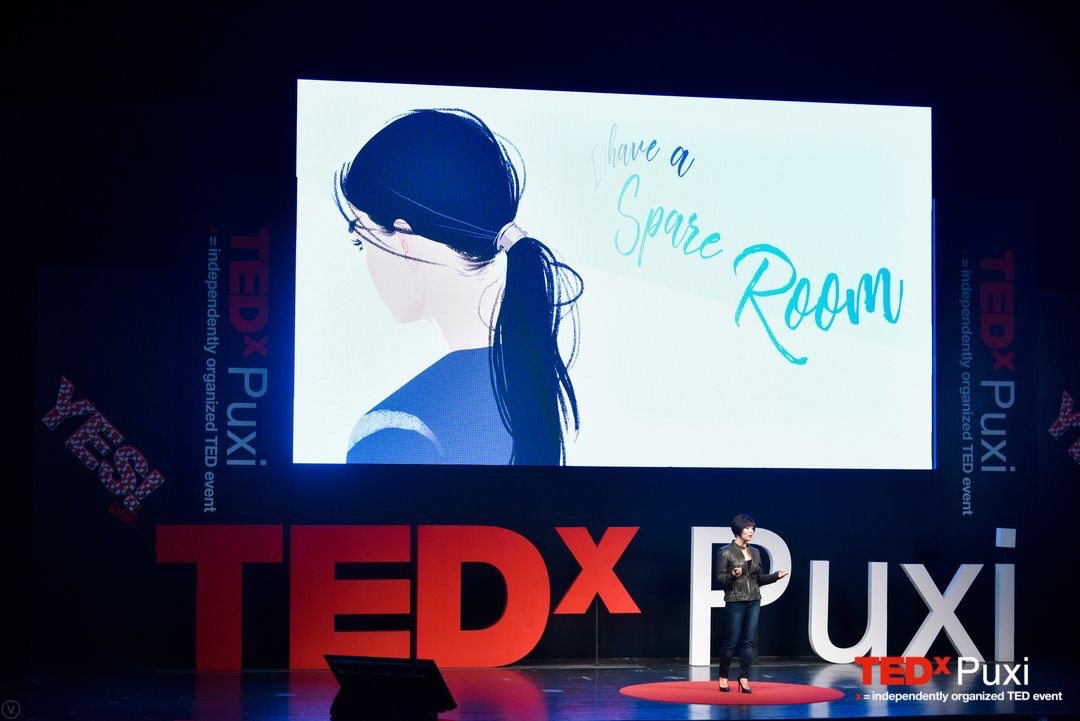
God knew how to reach me and how to use me. And I was just a kid—I’d had such an amazing, life-altering experience with that first girl that it became very easy to say yes to the next. And when Leah moved out to a foster family, she called me afterward and she said, “Hey, there was a girl I met on the street. Would you take her now that I’m not in your apartment?” And that’s how I got my second kid. You know, and there’s this beautiful thread. Some of them are connected. Some of them are not.
One kid was a young teenager, a child bride. My husband and I had been stretching on our front porch after a long hike. She literally ran in front of our house and fell in the street crying. I mean, God delivers these kids quite literally to our front door.
The boy who stayed with us for three years, he’s the one that I often talk about. His name is Tayo. We met him because we had taken care of a little girl for our next door neighbors. They had started to take care of her, wanted to adopt her, but they were headed back to the US while they were living in Shanghai. They didn’t want her to go back to the orphanage and asked if we would take her. And of course, we did that for our neighbors. But because we did that, we were connected with an organization that later came back to us and said, “Hey, there’s this little boy.” So just one thing leads to the other.
And I think this is really the definition of faith. Faith is taking a step without knowing exactly the outcome, but having absolute conviction that God is at work, and you get to be a part of what He is doing.
“Faith is taking a step without knowing exactly the outcome, but having absolute conviction that God is at work, and you get to be a part of what He is doing.” – Emily Chang
One of the books I love is Purpose Driven Life. We talk about purpose so much, I wanted to really intentionally avoid that word. It’s so overused and yet sort of broad. I wanted to challenge myself to think through, What do I mean, and what do I want people to take away?
So social legacy itself is a phrase that is really simply dissected. A legacy simply means you’re leaving something better than you found it. Isn’t that our calling? We are to leave this place better than we found it. We should leave every person we meet better than we found them. More joyful, more at peace, feeling valued, recognized, respected. And social defines the space in which we want to have that impact. So that’s what social legacy is.
I started realizing there’s a really simple model. It’s the intersection of a kind of a Venn diagram, which is on one side you’ve got your offer, that unique package that is uniquely you, a combination of your resources, your skills, your experiences, your capabilities. On the other side is your “offense,” which is that thing that will call to you more than anything else, the thing that breaks your heart when you see it and you think, I can’t let this pass, I have to do something about it.
Sometimes you just feel the prompting of the Holy Spirit. It takes a while to get to know your Father’s voice, but over time, every time you obey, you start to see how God works in your life. And when you feel a prompting, you get a little bit more clear each time on, Is this me or is this from God?
And in short, we’ve had seventeen babies and children who stayed in our spare bedroom over the last twenty-two years, from the time I was single and dating my husband, who’s my husband now, to when we were a couple, to very recently. The last kid just left our home about two months ago. And I think because this has always been—in my mind—God’s project, I just gave it up to Him. And, you know, it’s an incredibly freeing thing when all we have to do is say, “Okay, whatever You want, let me go try and be obedient and do the best I can.” And God is amazing and always surpasses your wildest imagination.
“It’s like an incredibly freeing thing when all we have to do is say, ‘Okay, whatever You want, let me go try and be obedient and do the best I can.’ And God is amazing and always surpasses your wildest imagination.” – Emily Chang
The Pursuit of a Social Legacy
What’s your social legacy? Because I believe there’s a lot of power to words. If you can define these things simply, you can claim them. And when you write them, they sort of become more concrete. And if you then share them with somebody else, it really becomes sort of a conviction or a promise and someone can hold you accountable to it.
So for me, defining your “offer and offense” unlocks the power to define what your social legacy is, and it gives you this opportunity to think about how you want to live with more intention. We want to live a more meaningful life. We want to be more, we want to impact more.
You know, I don’t think we should ever glorify ourselves and talk about how great we are, because in all reality, there’s nothing great about me. It’s only when I put myself aside and let God do what He has to do that something great can happen. I think every time you say yes, not only does yes amplify into more yes, but it strengthens your faith and your conviction. So the next time you say yes, you do it a little less fearfully, and the time after that you do it with anticipation. And now, when we have the opportunity to say yes, it’s like we jump leaping off a cliff because we cannot wait to see what God’s going to do with it.
“God, I’m So Grateful”
As a family, I think living in this kind of faith is incredibly unifying. We’ve experienced miracles. My daughter’s thirteen now. She has experienced unbelievable medical miracles. She has experienced true giving, not just comfortable serving at a soup kitchen once a year, which is a good thing. But making your life uncomfortable and dirty and messy by giving to the point not where you’re not comfortable anymore, but giving to the point where the need is met. And having her grow up that way, I think, has shaped her and as a result has shaped our family.
And because we have had the opportunity to experience so much abundance and to firsthand witness downright miracles, our family lives in a very different kind of faith than I did ten years ago, or that my family did when I was a child. I would say right now we are living in adventurous joy.
As I’m speaking now, Shanghai is in lockdown. There are issues of food scarcity. Politicians are struggling to understand how to handle the situation. But I have to say, while the situation is quite dire for some people who can’t access food, others who have been barricaded into their apartments, and yet our family is also living in this situation. We have a broken microwave. We have a broken dishwasher, and now we don’t have hot water. But I have to tell you: we’re living in such joy because none of this is anything more than a minor inconvenience. And when you approach it as a Christ-loving family, it’s a chance to demonstrate the goodness of God and to still turn around and say, “God, I’m so grateful.”
There’s still so much goodness in my life. I’m not hungry. And I’m now in a position, as a CEO, to take care of hundreds of people who are not in the same situation. That is a downright privilege. And when we say that, “The fields are ripe for harvest,” instead of looking at the current situation as a dire one, I get the opportunity not only as a leader, but as a unified family to say, “The fields are ripe, and this is our opportunity to be that city on a hill.”
I am working in a non-Christian workplace every day. I work with politicians, I work with people who are cutthroat, who think that they get ahead by putting me down. All of this stuff happens. There’s also a ton of goodness, don’t get me wrong, but it’s not a Christian environment. So how do I maintain who I am and work in this workplace as a city on a hill, as the salt and the light? I’ve realized that bringing my whole self to work is a very distinct way of being somebody different. And that’s sort of my own indicator in my professional life that I am kind of keeping my eyes focused on God because people will say, “There’s something different about you.” And when you hear that regularly, you’re like, Okay, there is something different about me. That’s good. I should be concerned when nobody says it and they don’t think there’s anything different. Then perhaps I have become of the world.
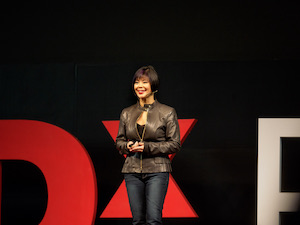
I think there are so many examples that come to mind of the harvest field and of the legacy I’ve had the opportunity to leave in each of my workplaces. I think work is something that gives me great joy. I love work, and I think that’s a role model for my daughter, that we do what we love and then we come home and we get to be with a family we love. Neither is a sacrifice. And at the same time, I’ve realized that a lot of my legacy at each of these workplaces has been—be it a Bible study, or a group of believers, or one Christian leader who has become strengthened and has stepped up to lead after I leave—that has been really, really encouraging to me.
There’s one moment I remember I was living in the States. I was in Seattle, and I woke up to hundreds of text messages and I thought, Oh my goodness, what happened last night? The leader I left behind at Procter and Gamble in the mid-2000s, the leader I left behind at Apple in the early 2010s, and then the leader I left behind at Intercontinental Hotels Group, right before I went back to the States, three women had all met—like, three generations of Christians in the workplace that I had the opportunity to mentor, had all met each other spontaneously. And one was talking about me and another said, “Wait, are you talking about Emily Chang?” And they introduced each other.
And then a third person came over and said, “Wait, I know Emily Chang.” And they were the three women I have had the opportunity to pour into, and the three of them got to meet each other. They took a photo, and that’s what they were sending to me.
So when I woke up in the morning, I just said, “I could die today and be so grateful because there’s nothing better than seeing this kind of fruit.” A lot of times we work in obedience and we live the way we’re called to live. We don’t get the opportunity to see fruit like that, and to see three generations of women meet each other and share stories and send pictures of each other laughing with tears in their eyes, I can’t imagine anything sweeter.
The Power of Intention
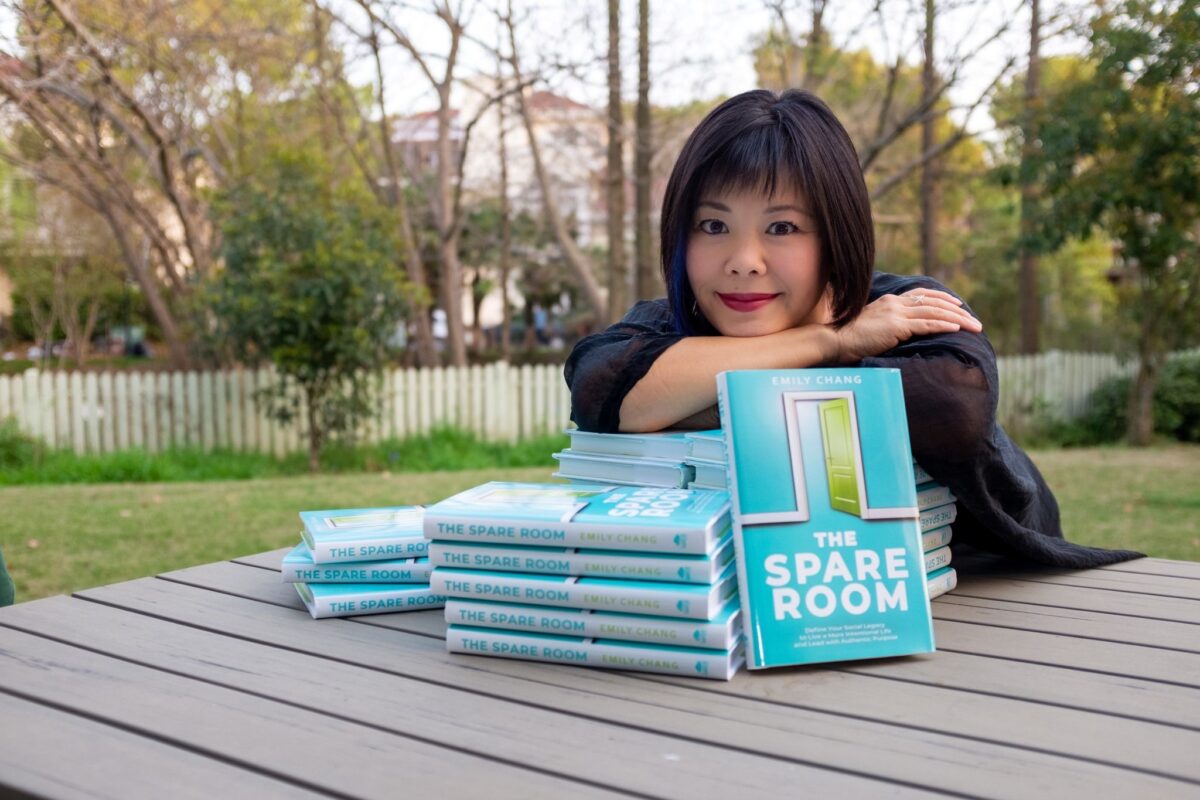
Every day has to be incredibly intentional to balance all the things that are important, because if we aren’t intentional, the day gets filled up. We’re living passively, and suddenly we look back and we say things like, “Oh, I don’t have time for this.” So for me, it starts with very micro habits.
For instance, I always start with a devotional in the morning. And this is my very first exercise of discipline in the morning. My alarm goes off on my phone, and I do not look at all those red bubbles, my emails, my texts. No, I open my app, and I start with my devotional. I go to prayer, and then I go to gratitude. And then I just pause and I listen. I think this is a great way to lead with intention and to make sure that I’m hearing God before I hear the gazillion voices and the noises of the world.
Sometimes I get a name in my head, and I’ll send a text to that person right away and say, “Hey, I was just thinking about you. How are you?” And I promise, inevitably the answer is, “How did you know? I needed that right now.” When we don’t make that space and we don’t turn our ear to that still, small voice, we’re missing these moments. We’re missing these promptings.So those micro moments are really important to me.
Jesus Calling is sitting here right next to me. But it’s not my devotional, it’s my daughter’s. And I borrowed it. She knew I was doing this tonight, and she’s like, “Mom, bring up my Jesus Calling. You can borrow it.” And I did have a look and her bookmark is indeed on today, so I’m really pleased that she is continuing a habit using my old Jesus Calling devotional.
You know, in the evening, we end every night together and we pray, we do what we call our “HPG’s.” It’s your high, your proud, and your gratitude. And we’ve been doing this since before she could even talk. What was your high of the day? What is it that you’re proud of? It could be of yourself or it could be of one of the other family members. But it’s a great way of practicing a habit that we’re not very comfortable with. We don’t like to say that we’re proud of ourselves. That sounds awkward and uncomfortable. But particularly as a child of Chinese immigrants, I live my life for my parents to be proud of me, I would have done anything for it. And actually being able to say I’m proud of myself is really saying, “Have I glorified God today? What have I done that is worthy?” And I think that’s a good habit to try and get in. And then we say gratitude every night. So that’s a habit we have as a family on, again, a micro level every night. I think these small and regular habits become a lifestyle. And then our lifestyle strengthens our beliefs, as well as our beliefs strengthen our lifestyle. And ultimately, that combination shapes who we are.
“I think these small and regular habits become a lifestyle. And then our lifestyle strengthens our beliefs, as well as our beliefs strengthen our lifestyle. And ultimately, that combination shapes who we are.” – Emily Chang
To close our time, I’d like to read a prayer excerpt from Jesus Listens, September 12th:
My living Lord,
As I focus my attention on You, I yearn for the dew of Your Presence to refresh my mind and heart. So many, many things vie for my attention in these complex times of instant communication. The world has changed enormously since You first gave the command: “Be still, and know that I am God.” Nonetheless, I realize this timeless truth is essential for the well-being of my soul. Just as dew refreshes grass and flowers during the still-ness of the night, so Your Presence revitalizes me as I spend time sitting quietly with You.
Please put Your thoughts into my mind more and more. Help me stay in communication with You, Lord.
In Your refreshing Name, Jesus,
Amen
Narrator: To learn more about Emily’s work, check out her book, The Spare Room, anywhere books are sold.
Stay tuned to Jodi Stuber’s story after a brief message.
A Gift of Encouragement & Peace: Jesus Calling for Moms
Celebrate the moms in your life with the beautiful gift of encouragement, reassurance, and peace with Jesus Calling for Moms!
Fifty Jesus Calling devotions speak to the power of love, the gift of strength, trusting God’s guidance, and so much more. Also included are: a prayer for mothers from Sarah Young, Scripture verses, journaling prompts and space for women to write their own prayers.
Order Jesus Calling for Moms today!
Narrator: Our next guest is Jodi Stuber, the co-founder of HopeWell Ranch in Michigan, an equine therapy program that facilitates healing and restores hope for children, families, and veterans. Jodi shares how her childhood dream of owning horses came true in a way she never anticipated, and how God is present in the connection between people and animals, both His beloved creations.
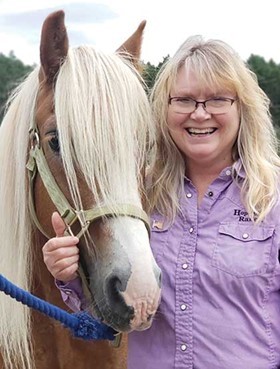
Jodi Stuber: My name is Jodi Stuber, and I’m the co-founder and executive director for Hopewell Ranch, which is a therapy farm in Weidman, Michigan.
I grew up in the suburbs of Lansing, Michigan. I’d always dreamed about one day having a horse, and sadly, that reality didn’t come to pass until we started Hopewell. But I was always drawn to animals, so I raised rabbits, I had a dog, I did a lot of 4H and just enjoyed being wherever animals were. My grandparents had a dairy farm, and every chance I got to go up there, I was in the barn, playing with the calves and just enjoying country life at their farm. And so being able to raise something and care for it, be responsible, learn about it, was really important to me.
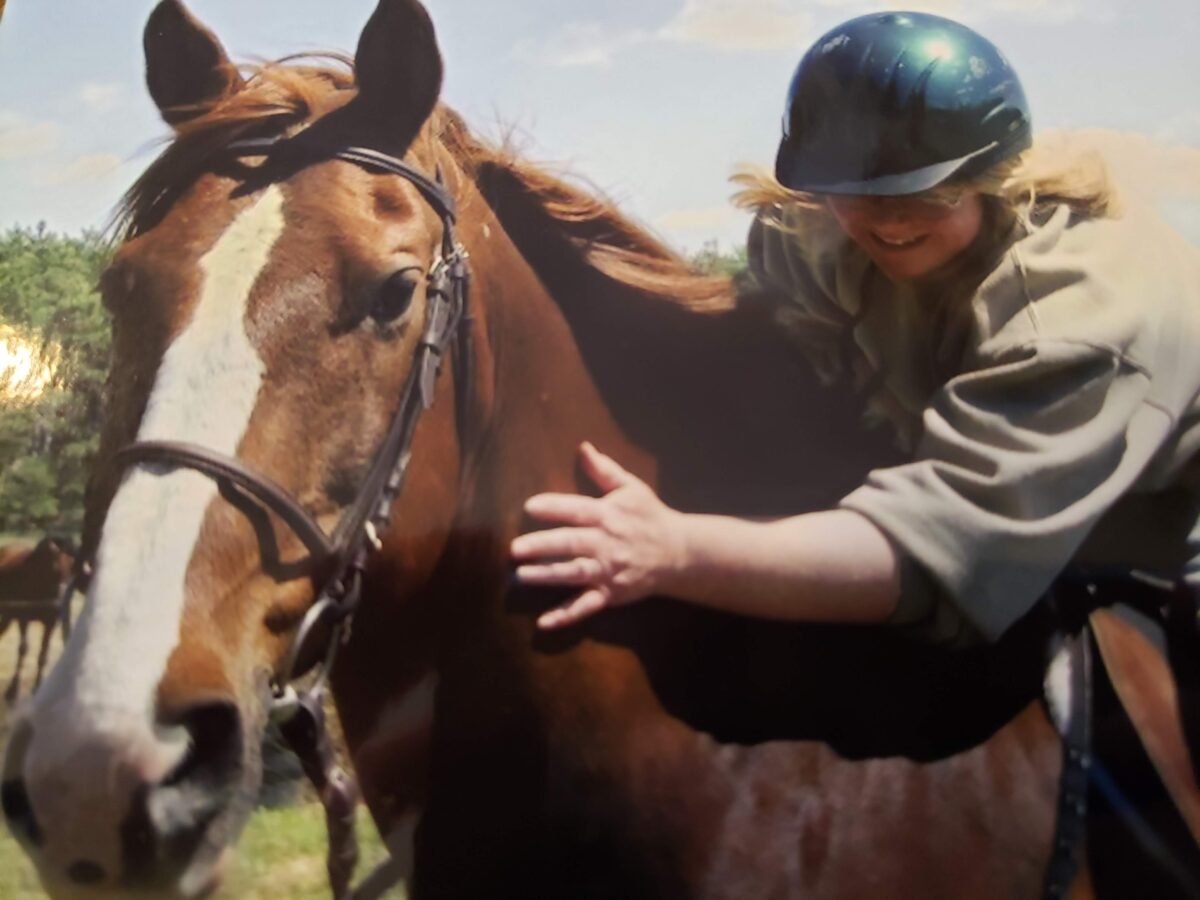
My parents were really gracious in allowing me to spend time with riding lessons and horse camps. But I hit a real rough patch in my high school years where even the principal of our high school got involved. And he said, “If we don’t step in, Jodi’s not going to make it.” And so between him, my home economics teacher, and my parents, they were able to enlist me in a program at our Lansing Community College. I was able to receive a lot of knowledge, but a lot of healing through my time with the horses there, and it was just beautiful. It gave me confidence to move past the depression and anxiety that was plaguing me and give me hope to continue, you know, that things were going to be better.
Equine Therapy at Hopewell Ranch
The idea of equine therapy hit me much later in life. I’ve always been an encourager. I want people to be well and want to see the best that God has for them. I feel like being the hands and feet of Jesus, extending healing to other people, that was a constant, I guess, in my adult years when I accepted Christ in 1992.
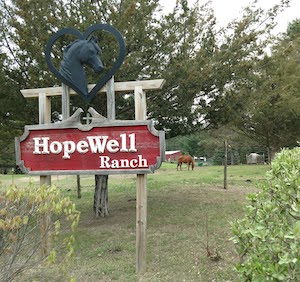
So Hopewell Ranch is the therapy farm that we started in 2004. And when we began the programs here, we didn’t know how big it was going to be. We thought it was just going to be a tiny little backyard ministry. And we had two horses and a pony, which, by the way, were the manifestation of all three of the horses that I had desired as a child. God was so specific that He brought a white pony, which is what I wanted at the age of five, a tall quarter horse with a white blaze and socks, and a thoroughbred—he was like my heart horse. He was actually the first horse that we acquired. And it was such a blessing to see how the Lord took the things that I desired and manifested them so that we could start with that healing presence of the Lord through those three animals. And it was just really special.
“It was such a blessing to see how the Lord took the things that I desired and manifested them so that we could start with that healing presence of the Lord through animals. And it was just really special.” – Jodi Stuber
Our first year we had twelve children. The second year it grew to 150 visitors. The following year, it grew to a thousand. And then prior to COVID, we were averaging about 3,000 people visiting the ranch a year, and we were able to serve different populations. We started with just children. But then in 2016, we were able to add our veteran program, which is called Project Solomon, and what an adventure that has been to be able to serve those who have served our country and hold space for them so that they can feel safe and wanted and encouraged for all the good things and even the hard things that they’ve experienced.
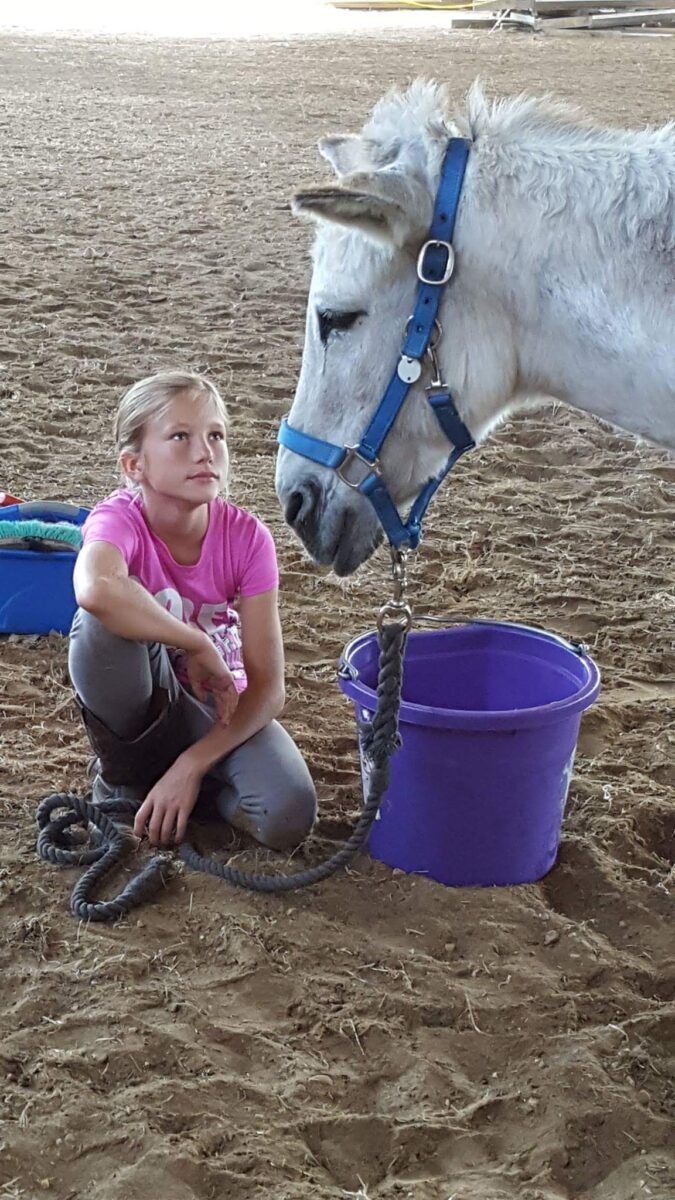
My morning starts fairly early, and sometimes I’m in the office as early as seven, 7:30. I’ll get up when my husband gets up for work, which is around quarter to six. And I like to spend that time with Jesus. I love that scripture, seeking for the kingdom of God and His way of doing things. And I love that because if I do spend the day with Him or if I do spend the beginning of my day with Him, everything else seems to go a little smoother. And so I love to spend time in the Word. I spend time in prayer.
And I love Jesus Calling. I love that devotional. I think that it’s so life-affirming and life-giving, and it’s just a great reminder that He’s here. And no matter what’s going on in my life personally, because my day to day changes every day as the director, when I go down to the ranch office, we do start our day in prayer. We’ll talk about the Bible, we’ll talk about scripture and how that can apply to the clients we’re working with or how we might need each other.
I love my staff because they’re very dedicated to seeking God and then they feel safe being able to come around the table and we worship together and just lift up the Lord. It’s such a beautiful way to begin. And then we disperse to our tasks for the day, whether that’s daily chores, which is always a constant, or getting emails sent out or phone calls made, fundraisers planned. All those important nonprofit things that we have to do. But I’m blessed to have such a beautiful staff who not only help me navigate things physically with the ranch, but they also help keep me on tasks spiritually. They remind me of how good God is. There’s days where I might come in and I’m like, “Okay, I don’t know how I’m going to get through today, but you guys are here and I’m so glad.” And then they pray, and we have such a beautiful group of people that whatever is needed, we laugh hysterically if that’s necessary. We cry together. We hold each other. We just are holding space for each other. And I just love that.
Creating Connections Between People and Animals
Some of the experiences we’ve had at the ranch—all of them I could say have been life-changing experiences for our participants in some way or another.
We had a veteran who helped us pioneer our Project Solomon program, and his name is John. And John asked if he could bring his daughter with him into the pasture, because she is his oldest child and she also has experienced the most trauma from him coming home with PTS [Post Traumatic Stress]. And when he came home, I mean, he’d share stories about how neighbors would set off firecrackers, and he would grab her and throw her to the ground and land on top of her because he was afraid they were under fire. And so she’d experience these kinds of things. Of course, pretty scary for anyone of any age, but especially a child.
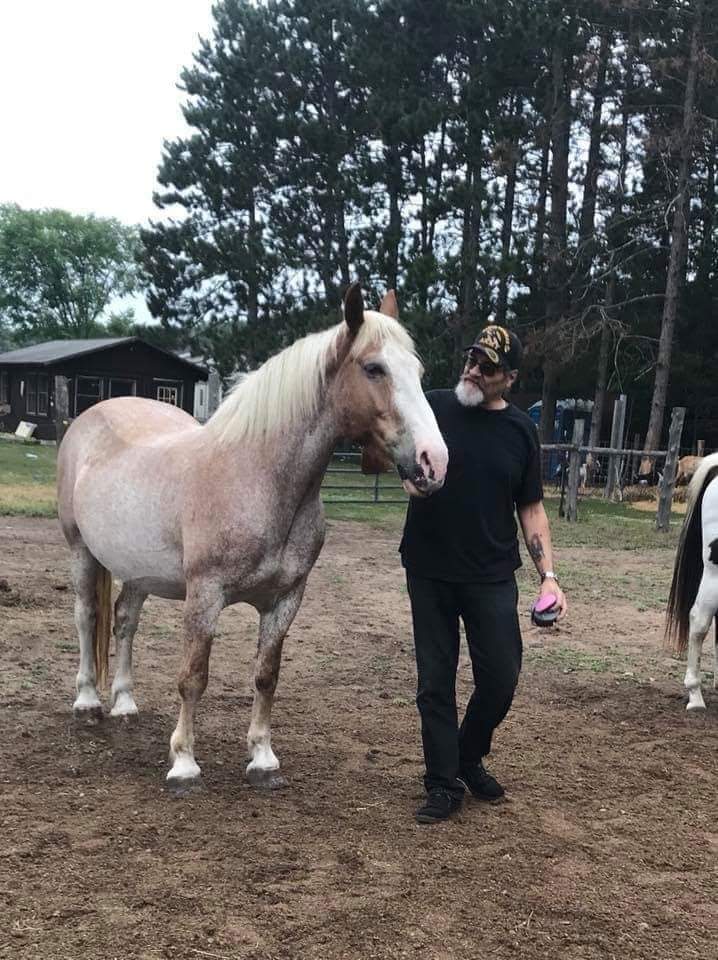
So then they got to spend time with our horse named Mercy, who comes from a trauma background, and they just spent time hanging out with her, brushing her, talking to each other. It was a really beautiful bonding time. And they left after the end of their session. And he came back the next week and asked me, “Jodi, what is it about that horse?”
I said, “What do you mean?”
And he said, “I went home and slept for nine hours. I haven’t done that since I got out of the military. I haven’t been able to sleep. And after spending that time with her, I could.”
I said, “Well, tell me a little bit about your past before you enlisted.”
And he said, “Well, it was very neglectful, very traumatic. And I had to enlist to be able to get away from that abuse.”
I said, “Well, your story and Mercy’s story parallel each other. And that, I believe, is why you felt so much peace from her and why she chose you. She knows what you need. And so therefore, she wants you to be healed and be well.”
And that was the beginning of a beautiful relationship between him and Mercy.
I receive a ringside seat to miracles from this work. I am able to see how God is impacting the lives of our animals, of our clients, our staff, our volunteers. It’s just beautiful. I never dreamed that this kind of a life could happen for me.
I like to think that when He formed the Earth and the people and the animals, that’s creation. And so I believe that when you have somebody who’s creative, God shares that piece of His heart with us, to give back to those around us. And I just think that’s a beautiful gift and I love it.
“I like to think that when He formed the Earth and the people and the animals, that’s creation. And so I believe that when you have somebody who’s creative, God shares that piece of His heart with us, to give back to those around us. And I just think that’s a beautiful gift and I love it.” – Jodi Stuber
Honestly, watching horses has made me a better human. I listen better to people, because when horses are with you, they’re communicating all the time. They don’t talk verbally. Well, they do make noise, but they’re not saying words. They talk with their body. And so when I see a child—their shoulders are forward, their head is cast down, their eyes are half mast—I realize there’s something there. And I just want to put them in the presence of one of our animals so they can start to hopefully feel better.
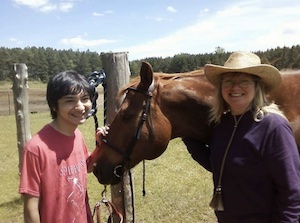
Typically by the end of a session, their heads come up, their shoulders go back, there’s a smile on their face, maybe there’s even a little bit of laughter. They’re ready to go home, but they’re ready to come back. And so that is a victory, to me, to be able to see people. I honestly think in our community and in the world today, because we’re so oriented towards our phones and towards being online as opposed to being in person, that it’s hard to see people. And I feel like there’s so many people feeling lonely because they don’t think anybody sees them. We know God sees them. And what I love is when He shines a spotlight on people that we can then minister to and try to help things be a little better. That’s so rewarding.
“I feel like there’s so many people feeling lonely because they don’t think anybody sees them. We know God sees them. And what I love is when He shines a spotlight on people that we can then minister to and try to help things be a little better. That’s so rewarding.” – Jodi Stuber
I had no idea that when I encountered Jesus that my life would take this road. And I am so grateful. It is honestly so humbling to be able to serve these beautiful people every day. It’s just an honor for all of us. Our whole team feels that way. We love the people. We love the encounters that we get to have.
Are there tough days? Absolutely. I don’t want it to always sound like rainbows and butterflies because there are thunderstorms and lightning strikes. But I honestly think that when we can pull back and look collectively at all the good things, that far outweighs the hard things, and we are so grateful to be able to do this work.
Narrator: To learn more about Jodi’s work, please visit www.hopewellranch.org, and be sure to check out her book, Project Solomon, everywhere books are sold.
If you’d like to hear more stories about carrying out God’s good work in the world, check out our interview with Brian Tome.
Next Week: Dr. Myron Rolle
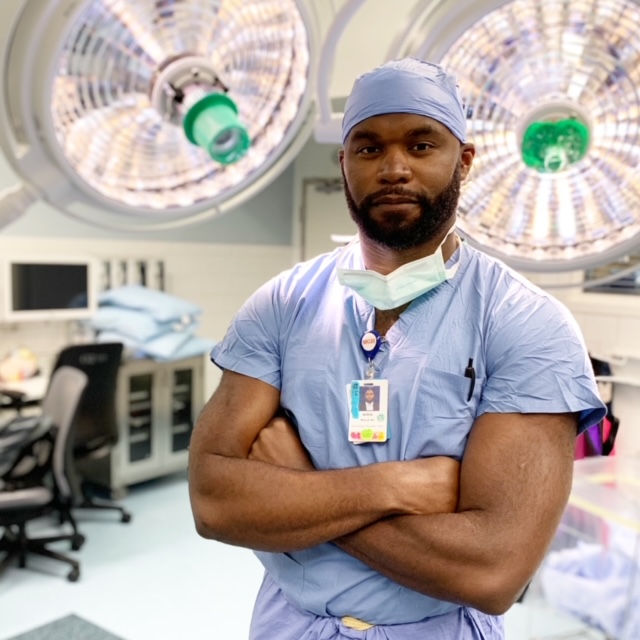
Narrator: Next time on the Jesus Calling Podcast, we’ll hear from former football safety turned neurosurgeon Dr. Myron Rolle. He shares his philosophy of making daily, small improvements in your life that add up to help you reach your big goals in life, which he refers to as the 2% way.
Dr. Myron Rolle: The 2% way is, I think, a very, very useful mindset and a process in getting to your goal or overcoming some sort of challenge. Sometimes we think that tasks are way too big, way too daunting, maybe a bit overwhelming. We get a little bit intimidated by them, but if we can break them down piece by piece and just do a little bit every day, then we have those small wins and small victories and we can see our growth and our improvement a month from now or six months from now or a year from now.
